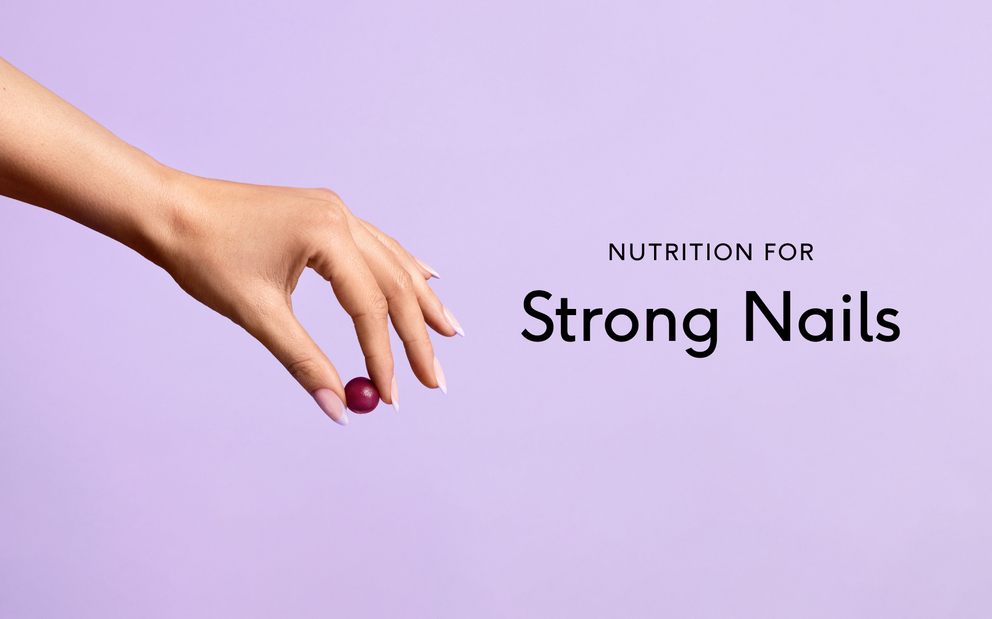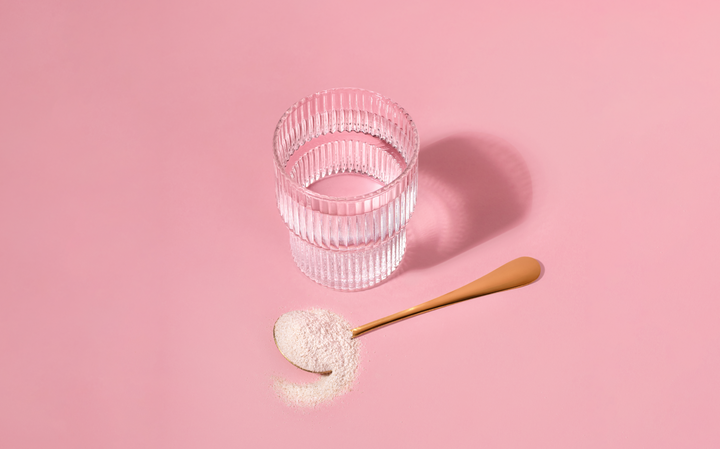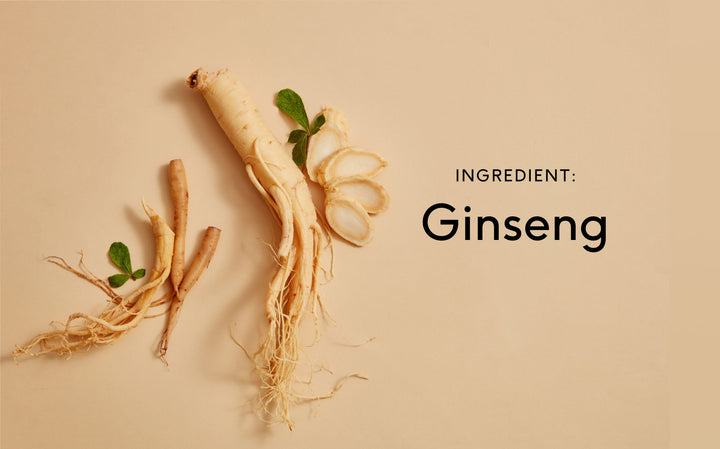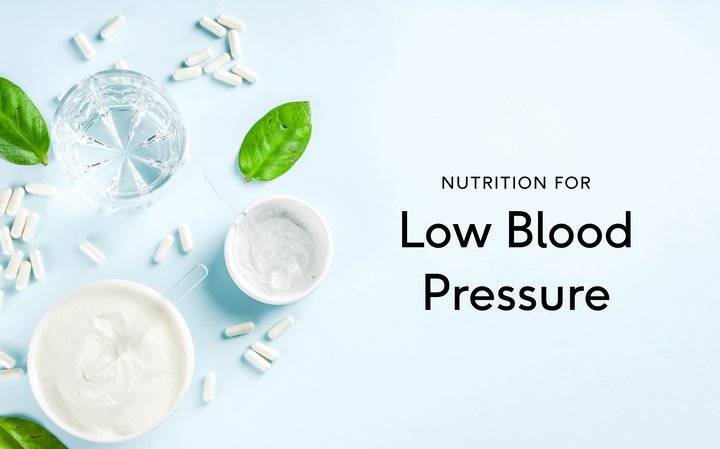Best Vitamins and Minerals for Strong Nails [2025 Nutritionist Reviewed]
Claire is a Registered Naturopathic Nutritionist. Her areas of expertise include children's and women's health. She gives 1-1 consultations and also delivers webinars, presentations and training on Children's optimal nutrition, for several companies.
Claire is a Registered Naturopathic Nutritionist. Her areas of expertise include children's and women's health. She gives 1-1 consultations and also delivers webinars, presentations and training on Children's optimal nutrition, for several companies.
Table of contents

| What is considered healthy nail growth | Approximately 2 to 3 mm per month. Complete nail replacement within 6 to 9 months |
| What factors affect nail health | Diet, nutrient deficiencies, illness, medication, dehydration, exposure to chemicals |
| What Vitamins can strengthen nails | Biotin, Vitamin A, Vitamin C, Vitamin E, Vitamin B12, Folic Acid |
| What Minerals can strengthen nails | Selenium, Magnesium, Zinc, Iron, Calcium |
| What additional ingredients can strengthen nails | Collagen, Amino Acids, Silica, MSM, Omega-3 |
Nails are not only an important aspect of our external appearance, but they are also mirrors of the internal constitution and nutritional status of our bodies1. Having strong and healthy nails indicates that you're getting the nutrients you need to maintain nail growth and reduce breakage. If ever your fingernails change in shape, texture, or appearance, you may be deficient in certain nutrients, or it could be an indication of ill health. Here's everything you need to know about the best vitamins you can take to improve your nail health.

1. What vitamins are good for nails?
While there are many vitamins that promote everything from nail strength to healthy hair, some specific vitamins are more effective at doing this than others. The most common vitamins you should take if you want your fingernails to gain a smooth and healthy appearance and strong constitution include Biotin, Vitamin B12, and Vitamin C1. Nutrients like Iron, Zinc and Folate are also believed to help nail strength1.
2. Can vitamins help with nail health?
Consistent research on the role of vitamins and minerals in nail health concluded that no evidence supports the use of vitamin supplementation for improving the nail health of healthy adults without micronutrient deficiencies. However, those with brittle nail syndrome can benefit from supplementation with Biotin or Silica1. If you've just recently had a manicure but find that your fingernails still appear to be unhealthy, then this is where it may be beneficial to address diet and nutrition. For instance, an Iron deficiency can cause your fingernails to become brittle or spoon-shaped1. Alternatively, the colour or pallor of the nail bed may be a sign of possible anaemia. White spots on the fingernails can be a sign that increasing zinc intake could be beneficial. Therefore, our nails are indicative of our health and eating a balanced diet plus taking the right vitamins can mean that your nail health should improve too.
3. How do vitamins strengthen and improve nail health?
Your fingernails are made from a protein known as keratin2. Proteins are the building blocks of your fingernails, hair, and skin. They grow directly from the base of your nail beds and are kept in place by your cuticle. The standard growth rate for fingernails is around 3 mm per month2.
If you want to keep your fingernails healthy, it's highly recommended that you maintain a balanced diet and take vitamins to prevent any potential deficiencies. With the right approach and advice, regular consumption of necessary vitamins and minerals can also improve your overall wellbeing and bodily functions, in addition to hair growth and even gut health.
4. Do nails need vitamins?
Just like the rest of your body, your fingernails need certain vitamins, minerals and nutrients in order to remain in good condition. By identifying which vitamins and minerals you may be lacking, adding them into your diet through high-quality supplements or diet optimisation can result in better health and nutrition. If your fingernails keep getting worse you could be low in anything from Iron, Vitamin A and C, Biotin or Collagen or you could recently have been unwell3. However, the primary recommended is to seek medical advice if the condition of your nails do continue to get worse.
5. Why do vitamins for nails work?
Different vitamins improve the health of your fingernails in different ways. For instance, Vitamin B7 known as Biotin is able to promote healthy cell growth while also assisting in the metabolism of various protein-building amino acids, which are necessary for nail growth4.
By consuming foods or nail supplements that are rich in Biotin, you may be able to improve brittle fingernails. Biotin is generally well regarded for its role with preventing hair loss, however this vitamin is also responsible for assisting enzymes to break down fats, protein and carbohydrates4,5 which can enable the release of key nutrients to provide further nourishment for your nails.
6. What are nails made of?
Toenails and fingernails are made of skin cells, which can produce structures known as skin appendages6. The most visible portion of the nail is referred to as the nail plate, which is made from a durable substance called keratin6. Nails grow approximately 2 to 3 mm per month and achieve complete replacement in 6 to 9 months6.
7. What vitamins are good for nails?
There are several vitamins that have proven to be effective at helping people obtain healthy nails, which are detailed in the following.
Vitamin E
This is a type of fat-soluble nutrient that's able to increase the amount of moisture in your nail bed as well as the surrounding skin, which helps to rejuvenate dry cuticles1. Wholegrains, sunflower seeds, almonds, and pumpkin are high in Vitamin E. Although to achieve higher amounts, it would be best to take this vitamin in supplement form.
Biotin
This vitamin is the best for brittle nails since it promotes healthy cell growth4. Foods that are high in Vitamin B7 include fish, nuts, eggs, and meat4. Vegetarians can take biotin supplements to receive an optimal amount of this vitamin.
Vitamin B12
This vitamin helps your body properly absorb Iron while also contributing to red blood cell formation, which facilitates blood flow to your nail beds7. The ideal amount of this vitamin that you should consume on a daily basis is 1.5 micrograms (mcg)8. Because of how difficult it can be to metabolise this vitamin and the fact it is safe in high doses, it's common to find 1,000-5,000 mcg supplements in stores. Vitamin B12 is primarily found in dairy and meat products and that’s why vegetarians and vegans may find themselves with lower levels of this particular B vitamin, and supplementing can be helpful8.
Vitamin C
Vitamin C is great for your fingernails as well as many other aspects of your health. This vitamin helps with the production of Collagen, which provides your fingernails with their durability and shape. As research has found collagen helped with nail growth and decreased the frequency of chipping and breakages9.
The primary foods that have high levels of vitamin C include oranges, broccoli, kiwi, peppers, sweet potato, and citrus fruits. As a vitamin, this is one of the best antioxidants you can consume. It’s water soluble, so best to keep consuming it throughout the day or to supplement in divided doses, for maximum benefit. For beauty supplements, you may also find it combined with hyaluronic acid and collagen to mitigate the most obvious signs of skin aging.
Vitamin A
This vitamin is commonly found in various nail care products. In vitamin A deficiency, the nails can become thin and brittle, leading to easy splitting10. Foods that are high in this vitamin include liver, oily fish, cheese, eggs, and milk. Although Beta-carotene is also regarded as a source of Vitamin A as the body can convert this into retinol. The main food sources of beta-carotene are peppers, carrots, sweet potatoes, mango, papaya and apricots. The total vitamin A recommended daily amount is 700ug (micrograms) for men and 600ug for women8.
Folate
Also known as Folic Acid, this vitamin assists in the creation of red blood cells. These cells allow nutrients and oxygen to be delivered to your nail beds, which can keep your fingernails strong and healthy. If you're deficient in this vitamin, you might notice ridges or discolouration1.
You should have a daily intake of 200 mcg of this vitamin as an adult. However, for women who are pregnant or trying to conceive, it is recommended to increase the amount of folic acid to 400 mcg to enable maternal tissue growth and foetal development. Supplementation would be the best form to increase folic acid intake, although there are many foods that include high levels:
- Black-eyed peas
- Spinach and dark green leafy vegetables
- Beef liver
- Asparagus
- Fortified breakfast cereals
- Brussels sprouts

8. What nutrients can improve nail health?
The many nutrients that can improve your nail health include3,6,9:
- Omega 3 fatty acids
- Iron
- Biotin
- Other B Vitamins
- Magnesium
- Calcium
- Vitamin C
- Vitamin A
- Vitamin E
- Folate
- Zinc
- Selenium
- Amino acids
- Collagen
- Silica
- MSM
These nutrients can work synergistically or in isolation to provide benefits for nail health.
However, nutrient deficiencies are not wholly responsible for the condition and health of your nails. Having ‘poor nails’ is not only defined by splitting or brittle nails, but fungal infections are also extremely common. As outlined by the Global Nail Fungus Organisation, recent studies have shown how gluten-free diets can improve nail health, especially when treating a nail fungal infection. Fungi can feed off sugar and gluten, which explains why a gluten-free diet may be beneficial for underlying nail infections. Combining proper nail care, and a good diet, rich in vitamins and minerals can create a huge impact on your nail’s health.

9. When is best to take vitamins for nails?
The optimal time of the day to take your vitamins can differ depending on the vitamin and mineral you're consuming. Although, if unsure and unless directed differently, it is always advisable to consume vitamins with food. The types of vitamins that are better in the morning on an empty stomach include the water-soluble vitamins such as most B vitamins and Vitamin C. You might want to wait until the evening to take Magnesium as it can have calming and relaxation effects. However, it is also important to consider if a particular nutrient is better absorbed with food or without. Fat-soluble vitamins A,D,E and K are best absorbed when taken with food, in addition to Calcium. On the other hand, Iron is best taken on an empty stomach as it can sometimes cause digestive issues and eating food may offset some of those unpleasant side effects. It is metabolised even better if taken with Vitamin C. However, when taking a multivitamin, such as a nail support complex as there is a mixture of water-soluble and fat-soluble, then it would always be preferable to take with food.
10. How much of vitamins and minerals do I have to take for strong nails daily?
Every person has different dietary and nutritional needs, which means that the amount of vitamins and minerals you should take daily to keep your fingernails strong depends on the current health of your fingernails. Other factors that determine how much vitamins you should take include your overall health, gender, body weight, lifestyle, medication and age8. As we have previously established, there are several vitamins and minerals that may help nail health and so if you're a healthy adult, your daily consumption of such vitamins and minerals should be as indicated by the NHS.
- Biotin - No recommendation in UK
- Zinc - 9.5 mg for men, 7 mg for women
- Selenium - 75 mcg men, 60 mcg for women
- Folate - 200 mcg for men and women, 400 mcg for pregnant or conceiving women
- Vitamin A - 700 mcg for men, 600 mcg for women
- Vitamin B12 - 1.5 mcg
- Vitamin C - 40 mg
- Vitamin E - 4 mg for men, 3 mg for women
- Iron - 8.7 mg for men over 18. 8.7 mg for women over 50. 14.8 mg for women aged 19 to 50.
- Calcium - 700 mg
11. Can vitamin deficiency cause weak nails?
If you suffer from vitamin and mineral deficiencies, dehydration, or a sub optimal diet you might notice weak nails, ridges, brittle nails, or discolouration.
12. Is nails splitting or brittle nails a sign of vitamin deficiency?
Brittle nails may be associated with a Biotin deficiency11. A study found that brittle nail syndrome appears to abate with supplementation of 2.5 mg dose of biotin daily11. Also, being deficient in B-complex vitamins can cause ridges to develop along your nail beds. The same is true if your diet doesn't have enough Calcium in it1. A few studies have found that a lack of essential proteins such as Keratin and vitamins, Folic acid, B vitamins, Vitamin C can result in Hangnails (a torn piece of skin next to the nail). Vitamin C is also necessary for the production of collagen, which is a protein that gives your fingernails their shape and strength. The vitamin is also important for general skincare routines.
You may also experience soft, splitting and chipping nails if you don't have enough dietary essential oils, the primary of which is Omega-312. Increasing your intake of omega-3 fatty acids helps to nurture the cells in the nail bed. This can reduce inflammation and encourage the absorption of nutrients12. You could look to increase your intake of oily fish e.g. salmon, mackerel, sardines, anchovy. Or increase your intake of plant sources e.g. chia seeds, walnuts. Or look to supplements.
13. What vitamins should I take to prevent weak nails?
Maintaining a healthy diet rich in essential fatty acids, ensuring adequate hydration and supplementing with a multivitamin and mineral complex can certainly help to strengthen nails. There are several vitamins and minerals that may be suitable for strengthening fingernails. Likely the best vitamin for nail strengthening is Biotin, Vitamin B74. Studies indicate that a consistent dose of Biotin for 6-9 months can increase a person's nail thickness by as much as 25%, which helps to keep fingernails from splitting11. If you notice white spots on your fingernails, this could be a sign that you're deficient in Zinc, Selenium, or Calcium1. A good multivitamin and mineral will provide all these nutrients.
There are other ways to protect the condition of your nails. For instance, using a cuticle or nail oil regularly, filing, using gloves when cleaning or doing the washing up will ensure hydration and prevent exposure to chemicals. If you regularly paint your nails or have harsh manicures, then it is advisable to have a break to let the nails breathe.

14. Where to buy vitamins for nails?
You can purchase nail vitamins at most online retailers, the primary of which are available on Amazon. These supplements are also available at the majority of health food stores or supermarkets. Keep in mind that you can purchase vitamins as gummies, powders and multivitamin capsules. Feel offers a number of products that are targeted for nail health, such as Feel Multivitamin, Feel Beauty Probiotic and soon to launch, Feel Beauty Gummies.
15. How long does it take for vitamins to work for nails?
Current research indicates that taking vitamins consistently for 3 months will help to minimise a vitamin deficiency1. Severe deficiency in a specific vitamin may require a lengthier period of consumption before optimal levels are restored. There also isn't one answer that applies to everyone.
The amount of time it takes for vitamins to work depends on your health, diet, and what form and dosage of vitamins you're taking. Generally speaking, 3 months should be sufficient to start noticing the benefits and improvements in nails.
16. Possible side-effect of taking vitamins for nails?
Some vitamins may cause side effects, especially if you are new to a supplement regime. The most common ones include13:
- Nausea
- Constipation
- Diarrhoea
- Gout
- Headaches
- Insomnia
- Nosebleeds
These issues should only occur occasionally and are most common when you exceed the safe upper limit for a daily vitamin. Keep in mind that it's possible to get these vitamins from the foods you eat, which in some cases may be sufficient and supplementation is not required. If you notice difficulties with breathing, a swollen face, or skin rash after taking a vitamin or mineral supplement, then you should obtain immediate medical attention.
References:
1. https://ijdvl.com/nails-in-nutritional-deficiencies/
3.Vitamins and minerals: their role in nail health and disease - PubMed (nih.gov)
4. https://www.hsph.harvard.edu/nutritionsource/biotin-vitamin-b7/
5. Biotin contributes to normal macronutrient metabolism.
6. Nutrition and nail disease - PubMed (nih.gov)
7. Reversible Melanonychia Revealing Nutritional Vitamin-B12 Deficiency - PMC (nih.gov)
8. https://www.nhs.uk/conditions/vitamins-and-minerals/
10. Cutaneous Changes in Nutritional Diseases | SpringerLink
11. Brittle nails: response to daily biotin supplementation - PubMed (nih.gov)
Recommended products













































 Back
Back







